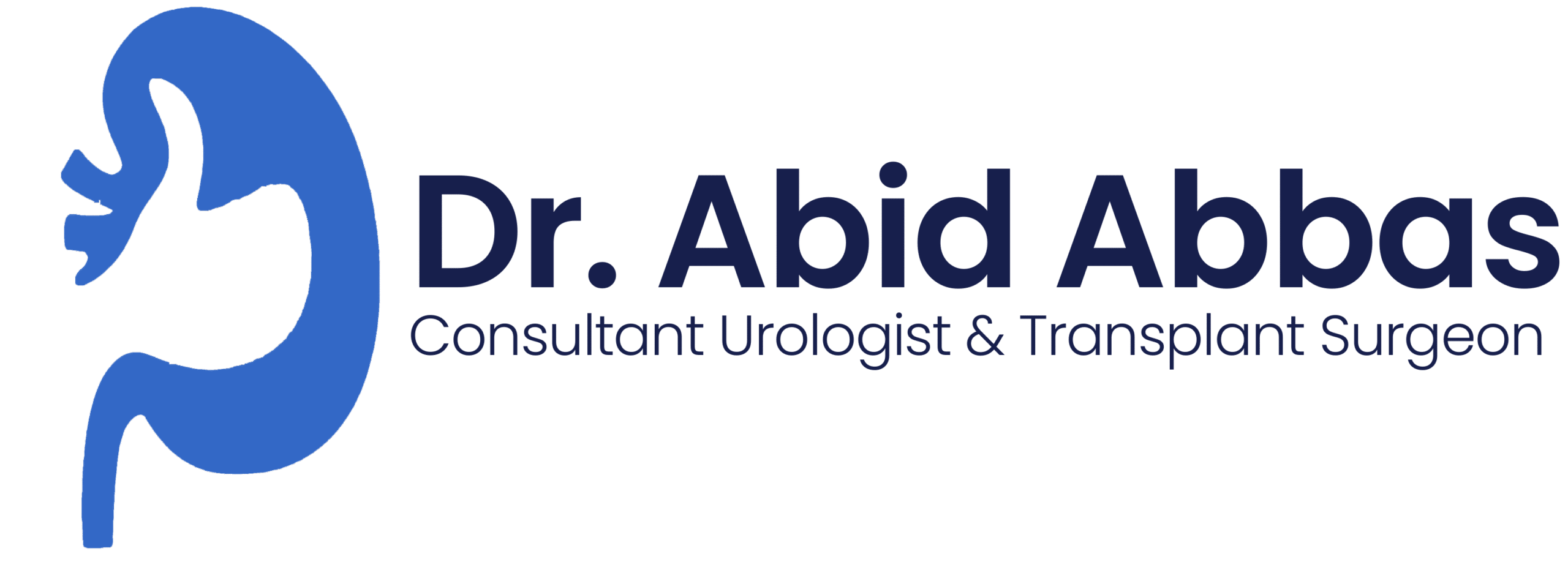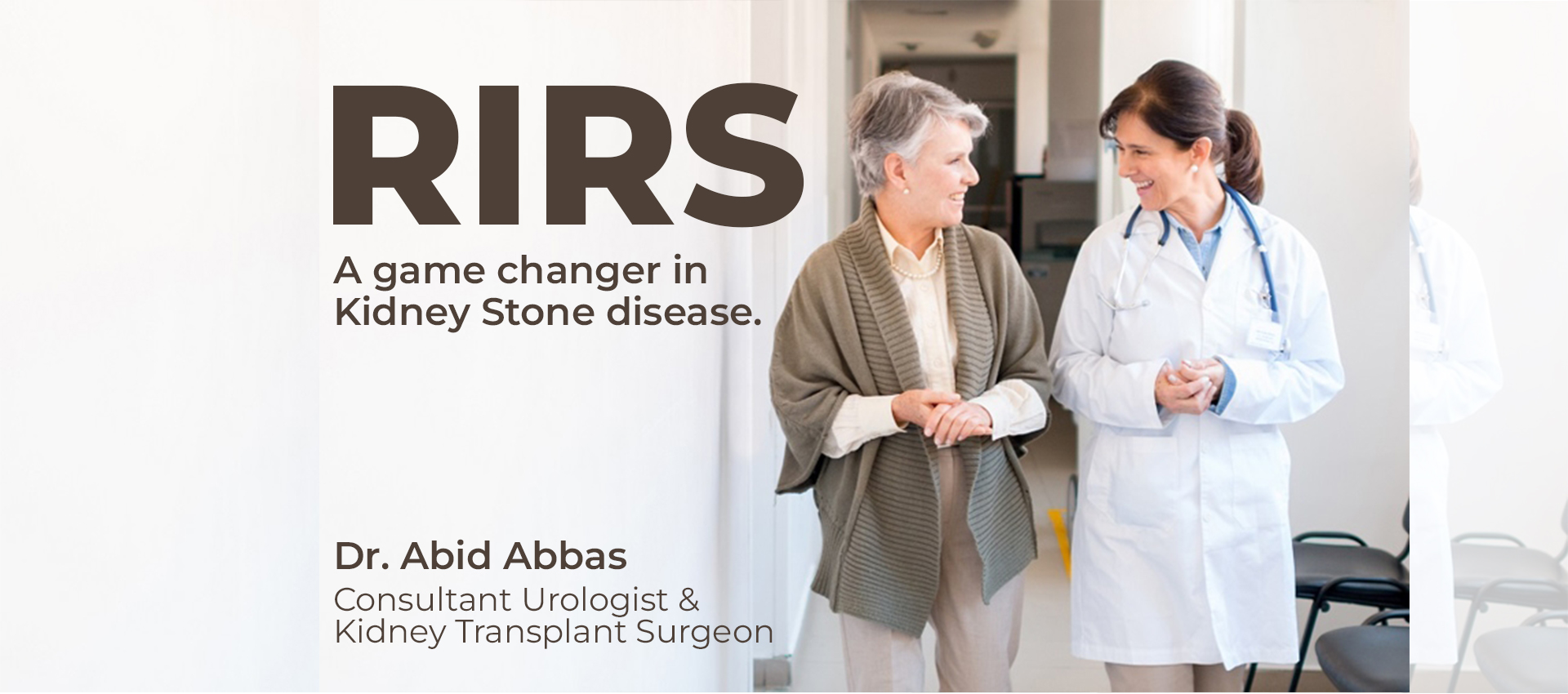RIRS (Retrograde Intrarenal Surgery) — Dr. Abid Abbas | Urologist in Lahore
RIRS (Retrograde Intrarenal Surgery) — Scar-Free Kidney Stone Removal
Minimally invasive, precision stone treatment performed by Dr. Abid Abbas, MBBS, FCPS — Consultant Urologist & Transplant Surgeon in Lahore.
Clinic: Saira Meraj Memorial Hospital, Shahdara, Lahore
Consultation hours: Monday–Saturday, 7:30 PM – 9:30 PM (except Sunday)
Phone / WhatsApp: 0300-4412571 | drabidurology.comBook Appointment — 0300-4412571
What is RIRS?
Retrograde Intrarenal Surgery (RIRS) is a modern, minimally invasive procedure to remove kidney stones without any skin incision. A flexible ureteroscope is passed through the natural urinary tract (urethra → bladder → ureter → kidney) and a laser (commonly Holmium:YAG) is used to fragment the stone into fine dust that can be passed or removed.
Who is a good candidate for RIRS?
- Small to medium kidney stones (commonly up to 2 cm)
- Stones in lower pole or other difficult-to-reach calyces
- Patients who prefer a scar-free option or cannot undergo PCNL/open surgery
- Stones not suitable for shockwave lithotripsy (ESWL)
Advantages of RIRS
Key benefits:
- No external cuts — performed through natural channels
- Lower pain and faster recovery than open or percutaneous procedures
- High precision using flexible scopes and laser technology
- Short hospital stay — often discharged within 24 hours
- Suitable for anatomically difficult stones
Dr. Abid Abbas — Experience & Approach to RIRS
Dr. Abid Abbas, MBBS, FCPS, has more than 15 years of clinical experience in urology with a focused practice in endourology and stone disease. He performs RIRS using the latest flexible ureteroscopes and Holmium laser systems, emphasizing:
- Complete stone clearance with safe “dusting” and retrieval techniques
- Individualized treatment choice — comparing RIRS vs PCNL vs ESWL
- Minimizing complications and preserving renal function
- Detailed follow-up and preventive strategies for recurrent stone formers
“In my practice, RIRS has become the preferred option for many patients who want effective stone removal without cuts or long downtime. I combine technology with careful patient selection to achieve high clearance rates and quick recovery.” — Dr. Abid Abbas
What to expect — Before, During & After RIRS
Before the procedure
Pre-op evaluation includes clinical history, urine tests, and imaging (ultrasound and CT KUB when required). Any infection is treated prior to surgery.
During the procedure
Performed under general or spinal anaesthesia. A flexible ureteroscope is passed to the kidney, the stone is fragmented with laser, and fragments are evacuated or left to pass. A temporary ureteric stent is often placed.
After the procedure
Most patients go home the next day. Expect mild urinary discomfort and blood-tinged urine for a few days. The stent (if placed) is removed after 1–2 weeks in an outpatient visit.
Success rates & possible complications
With experienced surgeons, RIRS has high clearance rates (commonly >90% for stones ≤2 cm). Possible minor complications include transient fever, stent-related discomfort, and, rarely, ureteral injury — all mitigated by careful technique and follow-up.
Frequently Asked Questions (FAQ)
Is RIRS painful? There is no pain during the operation due to anaesthesia. Mild burning or discomfort while passing urine is common for several days and is controlled with medication. How long until I can resume work? Many patients return to light activities within 2–3 days. Full physical recovery usually takes 3–7 days depending on the individual and job type. Will I still need more treatment after RIRS? Some patients may require a short second procedure if stone burden is large. Dr. Abbas evaluates each case pre-operatively and discusses realistic outcomes and alternatives (PCNL, ESWL). What follow-up is required? Follow-up imaging (ultrasound or X-ray/CT) is usually arranged at 4–12 weeks to confirm stone clearance and to plan prevention measures if needed. How much does RIRS cost? Costs vary by stone size, equipment required and hospital charges. At Saira Meraj Memorial Hospital, Dr. Abid Abbas offers transparent, itemized packages — contact the clinic for details.
Book a Consultation
To discuss whether RIRS is right for you, or to get a second opinion on kidney stone treatment, contact the clinic for evaluation and imaging review.
Dr. Abid Abbas, MBBS, FCPS (Urology)
Consultant Urologist & Transplant Surgeon — Endourology & Stone Disease
Clinic: Saira Meraj Memorial Hospital, Shahdara, Lahore
Phone / WhatsApp: 0300-4412571
Website: drabidurology.com
Consultation hours: Monday–Saturday — 7:30 PM to 9:30 PM (except Sunday)
Call / WhatsApp to Book — 0300-4412571
© Dr. Abid Abbas — Consultant Urologist & Transplant Surgeon. For appointments call 0300-4412571. Website: drabidurology.com

